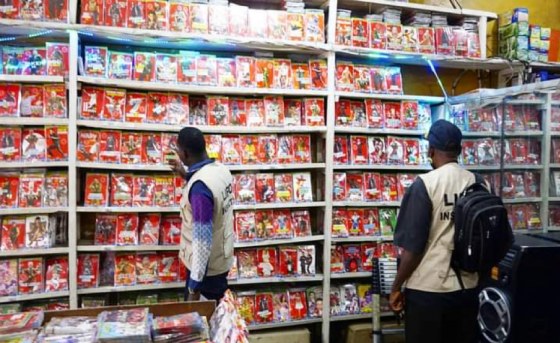Liberia: COSOL Moves into Mechanical Rights Collection

Flashback: Inspectors of the Liberia Intellectual Property Office (LIPO) and its secretariat, the Copyright Society of Liberia (COSOL) inspecting businesses trading in audio and audio-visual contents to remove pirated copyright materials from the stream of Liberia commerce.
The Copyright Society of Liberia (COSOL) has begun the collection of mechanical rights royalty, the first of its kind in the history of postwar Liberia.
The historical move comes after COSOL had worked closely with marketers and distributors to set up a mechanical rights license system in the country.
In copyright law, a mechanical license is issued by a rights management organization, such as COSOL, to another party to cover, reproduce, or sample the original musical works. It applies to copyrighted work that is neither free nor in the public domain. Liberia's 2016 copyright law called for the issuing of a mechanical rights license — making it compulsory.
“The journey has been tough, but we remain resolute in ensuring that appropriate legal and regulatory frameworks are in place, not just for mechanical collections, but also for all other rights,” COSOL Executive Director, Atty. Prince E. Decker in a statement.
“The institutionalization of the mechanical licensing system is an important moment for the broader music community. The hard work and collaboration among industries and stakeholders have laid the groundwork for the efficient and effective collection of royalties in favor of creators.”
COSOL, in a system of collective rights administration, is a specialized agency of the government through the Liberia Intellectual Property Office that is tasked with safeguarding the economic rights of creators.
It then guards the work by licensing the use; monitoring the user to enforce the conditions upon which the license has been granted, and collecting and distributing the royalty payable as a result of the licensed use.
However, the mechanical rights license that COSOL is issuing, for now, does cover digital download and streaming.
According to COSOL, work is being carried out to expand the Mechanical License Systems to include streaming platforms and that requires the setup of an accessible musical works database, and the development of several other related tools to ensure that the process of tracking royalties is smooth and seamless.
COSOL, however, is issuing a mechanical license called synchronization. This covers the song used in a video. Money generated from the license issued by COSOL is expected to benefit creators who are now in the position to receive accurate and timely royalty payments for the use of their intellectual Property.
Meanwhile, COSOL has announced that 25 businesses trading in copyrighted goods are the initial recipients of mechanical rights licenses.
According to the government IP rights administration office, these businesses are now in compliance with the country's 2016 Intellectual Property Acts.
